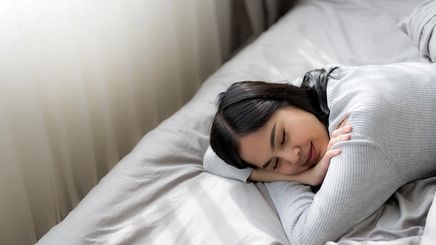
Many people consider sleeping a waste of time. After all, you could get a lot done in those eight hours – finish a deadline, squeeze in a workout, or take a late-night drive. But do you know how you go on vacation for a week and come back to work feeling refreshed and raring to go? Sleep works like that. Consider it your daily vacation from the daily grind. Here are five sleep benefits for your mind, body, and the in-between.
The Importance of Getting Enough Sleep
The 2018 study “The Extraordinary Importance of Sleep” confirms what you’ve known all along: sleep is vital for your mental and physical well-being. In an era that advocates , the benefits of sleep often get shunned to the side in favor of results. However, extensive research shows that dozing off will improve yourself and your work.
Sleep is critical to your physical health.
According to Harvard Medical School, frequent lack of sleep can cause long-term health consequences such as chronic medical conditions (diabetes, hypertension, heart disease). Poor sleep habits can also trigger stress (and vice versa), further aggravating such diseases.
Sleep and weight are inherently linked.
Sleeping time is when your body secretes the hormones that manage your appetite, metabolism, and glucose (sugar) processing. When you have an inadequate amount of sleep, you lack energy. Your brain tells your appetite that you’re still hungry to compensate even when you’ve had your required calories for the day.
Likewise, your eating habits can also affect your sleep. Overeating, for example, can cause discomfort that might disrupt your slumber.
Sleep keeps you sharp.
A 2021 study published in Brain journal reveals that poor sleep can lead to faster cognitive decline. According to a Harvard Health article, when people don’t get enough sleep, their focus and concentration plummet. Sleep also helps you retain information better.
Not only does this affect your work, but it could also compromise your safety. A 2014 PLoS One study reveals that the risk of traffic accidents for those who have poor quality sleep increases 3.35 times. The right amount of sleep improves your reflexes, including your mental response time.
Sleep helps you look better and healthier.
Beauty sleep isn’t just some fancy term. Good sleep helps restore and repair your cells and tissues, including your skin. Research in the May 2017 issue of Royal Society Open Science demonstrates that “naturalistic” sleep loss will be evident in your face. An all-nighter can cause puffy lids, , skin wear and tear, . Your skin is missing out on some natural rejuvenation and .
Moreover, the same analysis reveals that sleep-deprived people are also less inclined to initiate social interaction. Being tired and withdrawn may just affect your .
Sleep also maintains your mental and emotional health better.
Just like your appetite, the link between mental and emotional health and sleep is a two-way street. Sufficient REM sleep guides how the brain processes emotional information. According to the Sleep Foundation, lack of sleep damages how the brain evaluates positive memories. The consequences of this include mood swings and mental health disorders.
Likewise, less-than-stellar mental health contributes to sleep anxiety and general poor slumber. It is thus crucial to create a conducive sleep environment.
How Can You Sleep Better?
When it comes to sleep, quality is always better than quantity. While the popular notion is that eight hours of sleep is best, much research suggests that each individual has personal sleep needs.
Moreover, consider when you sleep. Reap better sleep benefits during the evening. Your circadian rhythm helps synchronize your bodily functions, regulates your temperature and eating habits, and aids in hormone production. In fact, the sleep hormone melatonin increases at nighttime.
Sleep isn’t always a sure thing. You don’t just magically close your eyes and wait for slumber to arrive. Experts recommend designing a routine and environment that encourages sleep. For example, eat at least two hours before. Or, stop using your mobile devices an hour before your bedtime.
You can also use natural sleep aids to help usher in the zzzs. Lavender, for example, is a well-known relaxant. The fragrant flower eases anxiety and tensions and lulls your senses. You can reap the in your pre-bedtime routine. Use the Dove Bar Relaxing Lavender Body Wash for a creamy, soothing experience.
You can do so many little things to embrace better sleep. Even brushing your teeth can help. Did you know that toothpaste with mint isn't just for flavor and fresh breath? According to a 2020 study in Sleep Science And Practice, peppermint can clear your head, relieving you from stressful thoughts that might disturb your snooze. Find a mint-fresh toothpaste, like closeup All Around Fresh Cool Mint Toothpaste for better breath and better sleep.
For your hair, Sunsilk Naturals Watermelon Freshness Shampoo will keep your head feeling fresh. There’s mint in the formulation to help you relax better.
Funnily enough, scientists are still trying to discover why humans sleep. But whatever they learn next, you know enough about sleep benefits to understand why getting that much-needed rest is crucial to your .